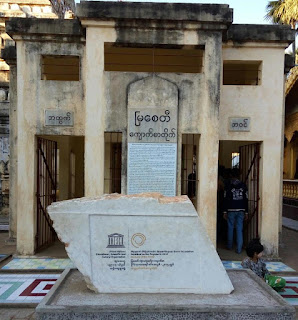8.Punctuation (၁)
8.Punctuation (၁)
အင်္ဂလိပ်စာရေးသားရာတွင် အောက်ပါကိစ္စရပ်များအတွက်
(Punctuation Marks) ကို သုံးရသည်။
***အဓိပ္ပါယ် ပေါ်လွင်စေရန်
***လေးနက်မှုသိသာစေရန်
***အနက်မတူ ကွဲပြားမှုကို ရှောင်ရှားစေရန်
***အပြောတွင် အသံအနေအထားနှင့်
အဆိုင်းအငံ့တို့ကို သိသာစေရန်
1. Period /
Fullstop (.)
*** ဝါကျကို အဆုံးသတ်သည်။
Eg: This is the end.
*** အတိုကောက်များတွင်
သုံးသည်။
Eg: A.D.
Etc.
Count.
Jan.
e.g.
a.m.
*** အင်တာနက်ဝဘ်ဆိုဒ်နှင့်
အီးမေးလ် လိပ်စာများတွင် သုံးသည်။
Eg: https://htooaungwintt.blogspot.com
https://shintnyolay.blogspot.com
2. Comma (,)
*** အစဉ်လိုက်လာသော
စကားလုံး၊ စကားစု၊ Clause တို့ကို ခြားပေးသည်။
Eg: Men, women, and
children ran for cover.
A bouquet of red, pink
and white roses
Tea, coffee, milk or hot
chocolate
*** အဓိက Clause ၏ ရှေ့ကလာသော
Adverval Group ကို ခြားပေးသည်။
Eg: When they found the
enemy had retreated, they occupied the town.
If you keep calm, take
your time, concentrate and think ahead, then you’re likely to pass your test.
Worn out after all the
excitement of the party, the children soon fell asleep.
*** ကြားဖြတ်စကားစုများနှင့်
ဝါကျပိုင်းကို ခြားပေးသည်။
Eg: Your second question,
on the other hand, is irrelevant.
*** ဖြည့်စွက် စကားစုနှင့်
ဝါကျ၏ အဓိကပိုင်းကို ခြားပေးသည်။
Eg: They visited Bagan,
the famous historical site.
The Pennine Hills, which
are very popular with walkers, are situated between Lancashire and Yorkshire.
*** မိတ်ဆက်စကားစု၊
အာမေဋိတ်နှင့် ဝါကျကို ခြားပေးသည်။
Eg: Oh, so that’s where
it was.
As it happens, however, I
never saw her again.
By the way, did you hear
about Sue’s car?
*** Direct
Question ကို စပေး၊ ဆုံးပေးသည်။
Eg: The delegate replied,
“ That is correct ”.
“ That is correct ” ,
replied the delegate.
It’s quite expensive,
isn’t it?
You live in Bristol.
Right?
“ Come back soon,” she
said.
Disraeli said, “ Little
things affect little minds ”.
*** အနက်မရှင်းမှုကို
ဖြေပေးသည်။
Eg: to Nyi Nyi, Ko Ko is
special.
*** ကိန်းဂဏန်းများကို
စုပေးသည်။
Eg: 100,000
Remark။ ။ ဂဏန်း(၄)လုံးပါကိန်းများ၊ နှစ်ပြဂဏန်းများ၊
လမ်းနံပါတ်များတွင် မသုံးပါ။
1981 2022 4334 forest
street
*** နာမည်များနှင့်
ဘွဲ့များ ခွဲခြားပေးသည်။
Eg: Dr.U Ko Ko, FRCS
*** မြို့အမည်၊ နယ်အမည်ကို
ခြားပေးသည်။
Eg: Intagaw, Bago
Township
3. Colon (:)
*** အရှေ့ကသွားပြီးသော
စကားစုကို ရှင်းပြ၊ ချဲ့ပြ၊ ထပ်ဆိုသော စကားစုကို ဖော်ပြသည်။
Eg: The building was
poorly designed: it lacked both fuction and unity.
These are our options: we
go by train and leave before the end of the show; or we take the car and see it
all.
*** Informal
writing တွင် ရှေ့ကစကားစု (Phrase/ Clause)တွင် အချက်အလက်များကို (Main Clause) ထက်
ပြည့်စုံစွာဖော်ပြထားတတ်သည်။
Eg: The garden had been
neglected for a long time: it was overgrown and full of weeds.
*** စကားလုံး၊ စကားစုကို
အာရုံစူးစိုက်စေသည်။
Eg: There is only one
goal: freedom.
As Kenneth Morgan writes:
The truth was, perhaps, that Britain in the years from 1914 to 1983 had not
changed all that fundamentally.
*** အစဉ်တစ်ခုကို ဖော်ပြသည်။
Three countries were
represented: China, Thailand and Myanmar.
*** အချိန်ပြရာတွင်
နာရီ၊ မိနစ်နှင့် စက္ကန့်တို့ကို ခွဲခြားသည်။
Eg: 9:30 am
4. Semicolon (;)
*** Particle ဖြင့်
ဆက်နွယ်မထားသော Main Clause များကို ဆက်နွယ်ပေးသည်။
Eg: Some positions were
occupied; some were not.
The sun was already low
in the sky; it would soon be dark.
*** furthermore,
consequently, however ဖြင့် ဆက်နွယ်ထားသော Main Clauses များကို ဆက်ပေးသည်။
Eg: Speeding is illegal;
furthermore, it is dangerous.
*** Particles ဖြင့်
ဆက်နွယ်ထားသော်လည်း comma ပါထားသော clauses များကို ဆက်ပေးသည်။
Eg: The search is for
people who can think creatively, who can think for themselves; people who can
work on their own ideas, and who can express themselves clearly.
She was determined to
succeed whatever the cost; she would achieve her aim, whoever might suffer on
the way.
5. Question Mark (
? )
*** တိုက်ရိုက်မေးခွန်းအဆုံးတွင်
မေးခွန်းသင်္ကေတအဖြစ် သုံးသည်။
Eg: Where’s the car?
You’re leaving already?
*** နေ့စွဲ၊ ရက်စွဲနှင့်
ခုနှစ်များကို ဖော်ပြရာတွင် သေချာမှုမရှိလျှင် မေးခွန်းသင်္ကေတကို သုံးသည်။
Eg: John Marston
(?1575-1634)
*** တစ်ဆင့်ခံပြောသည့်
မေးခွန်းဝါကျတွင် မေးခွန်းသင်္ကေတကို မသုံးရပါ။
Eg: He asked if I was
leaving.
ထူးအောင်ဝင့်



Comments
Post a Comment